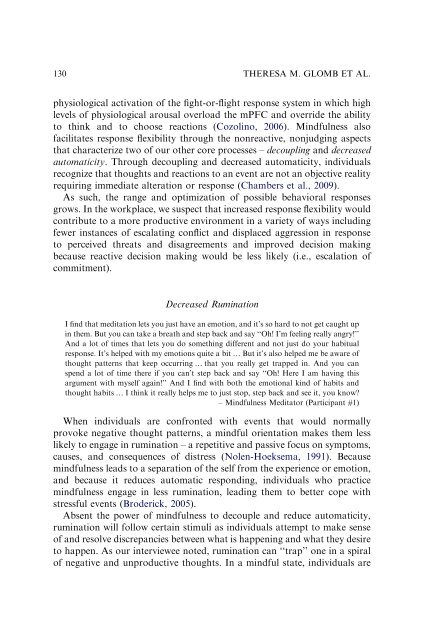Mindfulness at work (Glomb, Duffy et al, 2012) - Human Resources
Mindfulness at work (Glomb, Duffy et al, 2012) - Human Resources
Mindfulness at work (Glomb, Duffy et al, 2012) - Human Resources
You also want an ePaper? Increase the reach of your titles
YUMPU automatically turns print PDFs into web optimized ePapers that Google loves.
130THERESA M. GLOMB ET AL.physiologic<strong>al</strong> activ<strong>at</strong>ion of the fight-or-flight response system in which highlevels of physiologic<strong>al</strong> arous<strong>al</strong> overload the mPFC and override the abilityto think and to choose reactions (Cozolino, 2006). <strong>Mindfulness</strong> <strong>al</strong>sofacilit<strong>at</strong>es response flexibility through the nonreactive, nonjudging aspectsth<strong>at</strong> characterize two of our other core processes – decoupling and decreasedautom<strong>at</strong>icity. Through decoupling and decreased autom<strong>at</strong>icity, individu<strong>al</strong>srecognize th<strong>at</strong> thoughts and reactions to an event are not an objective re<strong>al</strong>ityrequiring immedi<strong>at</strong>e <strong>al</strong>ter<strong>at</strong>ion or response (Chambers <strong>et</strong> <strong>al</strong>., 2009).As such, the range and optimiz<strong>at</strong>ion of possible behavior<strong>al</strong> responsesgrows. In the <strong>work</strong>place, we suspect th<strong>at</strong> increased response flexibility wouldcontribute to a more productive environment in a vari<strong>et</strong>y of ways includingfewer instances of esc<strong>al</strong><strong>at</strong>ing conflict and displaced aggression in respons<strong>et</strong>o perceived thre<strong>at</strong>s and disagreements and improved decision makingbecause reactive decision making would be less likely (i.e., esc<strong>al</strong><strong>at</strong>ion ofcommitment).Decreased Rumin<strong>at</strong>ionI find th<strong>at</strong> medit<strong>at</strong>ion l<strong>et</strong>s you just have an emotion, and it’s so hard to not g<strong>et</strong> caught upin them. But you can take a bre<strong>at</strong>h and step back and say ‘‘Oh! I’m feeling re<strong>al</strong>ly angry!’’And a lot of times th<strong>at</strong> l<strong>et</strong>s you do som<strong>et</strong>hing different and not just do your habitu<strong>al</strong>response. It’s helped with my emotions quite a bit y But it’s <strong>al</strong>so helped me be aware ofthought p<strong>at</strong>terns th<strong>at</strong> keep occurring y th<strong>at</strong> you re<strong>al</strong>ly g<strong>et</strong> trapped in. And you canspend a lot of time there if you can’t step back and say ‘‘Oh! Here I am having thisargument with myself again!’’ And I find with both the emotion<strong>al</strong> kind of habits andthought habits y I think it re<strong>al</strong>ly helps me to just stop, step back and see it, you know?– <strong>Mindfulness</strong> Medit<strong>at</strong>or (Participant #1)When individu<strong>al</strong>s are confronted with events th<strong>at</strong> would norm<strong>al</strong>lyprovoke neg<strong>at</strong>ive thought p<strong>at</strong>terns, a mindful orient<strong>at</strong>ion makes them lesslikely to engage in rumin<strong>at</strong>ion – a rep<strong>et</strong>itive and passive focus on symptoms,causes, and consequences of distress (Nolen-Hoeksema, 1991). Becausemindfulness leads to a separ<strong>at</strong>ion of the self from the experience or emotion,and because it reduces autom<strong>at</strong>ic responding, individu<strong>al</strong>s who practicemindfulness engage in less rumin<strong>at</strong>ion, leading them to b<strong>et</strong>ter cope withstressful events (Broderick, 2005).Absent the power of mindfulness to decouple and reduce autom<strong>at</strong>icity,rumin<strong>at</strong>ion will follow certain stimuli as individu<strong>al</strong>s <strong>at</strong>tempt to make senseof and resolve discrepancies b<strong>et</strong>ween wh<strong>at</strong> is happening and wh<strong>at</strong> they desir<strong>et</strong>o happen. As our interviewee noted, rumin<strong>at</strong>ion can ‘‘trap’’ one in a spir<strong>al</strong>of neg<strong>at</strong>ive and unproductive thoughts. In a mindful st<strong>at</strong>e, individu<strong>al</strong>s are


